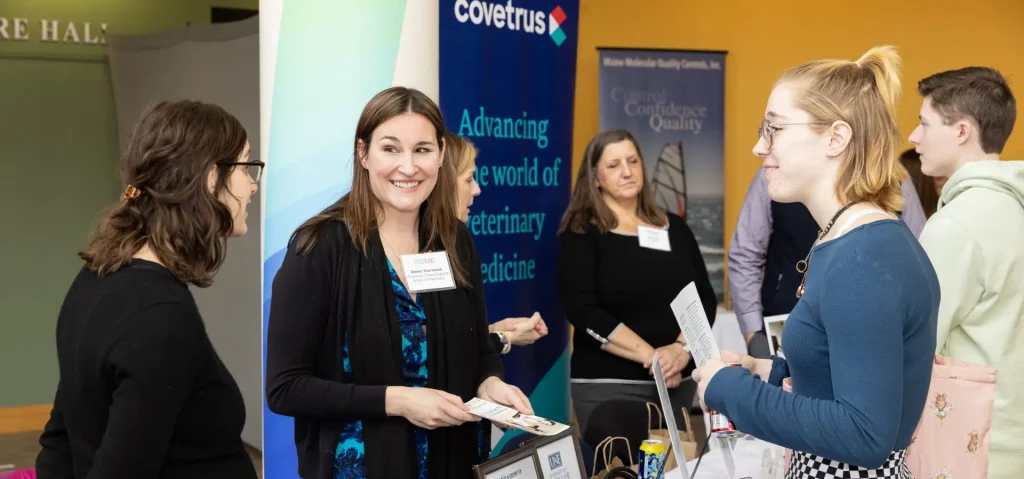Navigating Career Fairs: A Student-Athlete’s Guide to Making Connections

Career fairs can be overwhelming. The booths, the recruiters, the crowds — it’s a lot. But for student-athletes, they also present an exciting opportunity to showcase your strengths in a space where discipline, resilience, and communication skills matter just as much as academic accomplishments. You’ve already mastered juggling practice schedules, travel, and coursework. Now it’s time to transfer those skills into building a network and launching your future career.
Know What You Bring to the Table
Before walking into any career fair, take a step back and assess what makes you stand out. As a student-athlete, you’ve already demonstrated time management, perseverance, the ability to perform under pressure, and the drive to continuously improve. Those aren’t just buzzwords — they’re the kinds of qualities recruiters look for in candidates. You don’t need to be an expert in your future industry yet, but knowing how your athletic experience translates into the workplace is crucial.
When preparing your resume and elevator pitch, don’t shy away from including your sport and the role you’ve played on your team. Whether you were a captain or a consistent presence on the field, each experience adds depth to your story. Employers love candidates who can work collaboratively, accept feedback, and stay motivated during tough times — traits student-athletes live and breathe.
Research in Advance
Most career fairs share a list of attending companies ahead of time. Use that list to your advantage. Prioritize the employers you’re most interested in, and do a little digging: What does the company do? What entry-level positions or internships are they offering? Do they have any alumni from your school — or better yet, former athletes — working there?
Coming into a conversation with specific questions shows you’ve done your homework and are genuinely interested. It helps you stand out in a sea of quick handshakes and general inquiries.
Practice Your Introduction
You’ll only have a few minutes — sometimes less — to make an impression. Practice a short, confident intro that includes your name, major, graduation year, sport, and a quick line about what you’re looking for.
For example:
“Hi, I’m Maya Jackson, a senior at [University Name] majoring in marketing and a member of the women’s soccer team. I’m graduating this spring and looking for opportunities in brand strategy or social media marketing. I’ve developed strong teamwork and time management skills as a student-athlete and would love to hear more about your open roles.”
It doesn’t need to be perfect, just polished enough to get a conversation going and leave the recruiter with a clear picture of who you are.
Bring the Right Materials
Make sure you’ve printed out multiple copies of your resume and that each one is clean, concise, and easy to read. Have a professional email address listed and keep your phone handy but silenced — not buzzing in your pocket during a conversation.
It’s also smart to bring a padfolio or notebook to jot down notes after each interaction. Write down names, company tidbits, or anything that will help you personalize your follow-up message later.
Dress the Part
You’re representing yourself, your team, and your school. Business casual or business professional attire is a must — that means no hoodies, athletic wear, or sneakers. Choose something that feels comfortable but shows that you’ve put thought into how you present yourself.
Network Like You Compete
Approach each booth like it’s a big game. Stay focused, energized, and open to new challenges. If a line is long, use the wait time to review your notes or chat with other students in line — you never know who you’ll meet.
And don’t limit yourself to only the big-name companies. Smaller or lesser-known organizations might offer great roles and more hands-on experience right out of the gate.
Follow Up and Follow Through
Within 24–48 hours after the fair, send thank-you emails to the recruiters you spoke with. Reference something specific from your conversation and express interest in staying connected or learning more. It doesn’t have to be long — it just has to show appreciation and keep the conversation going.
Example: “Hi [Recruiter’s Name], it was great meeting you at [Career Fair Name] on [Day]. I enjoyed learning about your [program/internship/company initiative] and really appreciated your advice on navigating a career in [industry]. I’ve attached my resume and would love the opportunity to stay in touch.”
Keep a spreadsheet or notes on who you spoke with and any action items (follow-ups, applications, etc.). Being organized after the fair is just as important as showing up prepared.
Turn Nerves into Momentum
It’s normal to feel nervous — even pro athletes get butterflies before game time. But just like on the field, preparation pays off. Use the same focus and drive that helped you win games and beat PRs to make a great impression and forge real professional relationships.
Career fairs are your chance to tell your story. Be confident, be curious, and trust that the work ethic you’ve built as a student-athlete will continue to open doors long after the final whistle blows.

